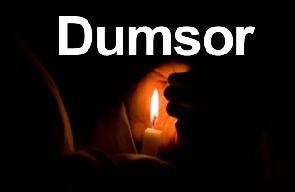The Association of Ghana Industries (AGI) has decried the politicisation of power outages in the country and called for swift national consensus to solve the challenges inherent in the energy sector.
The Association said the politicisation of power cut to industry and households was a setback to Ghana’s quest to industrialise, describing electricity as the engine that fueled industrial growth that ought not to be politicised.
“So far as the lights are going off intermittently, once a day or twice a day, it’s ‘dumsor,’” Mr Kwame Jantuah, Chairman, Oil and Gas sector, said in an exclusive interview with the Ghana News Agency.
This was on the sidelines of a policy dialogue to mark World Sustainable Energy Day in Accra, organised by the Centre of Excellence in Public Utility Regulation (CEPUR).
CEPUR, a citadel of training for utility regulations, is a brainchild of the Public Utilities Regulatory Commission (PUCR) and the Ghana Institute for Management and Public Administration (GIMPA).
“Energy is like air, and so important for houses and industry, and we cannot mess with it. Where power is concerned, it shouldn’t be a political situation, but a national discussion where political leaders sit and come to an agreement,” Mr Jantuah said.
This comes on the back of recent outages across the country, and a call for the Electricity Company of Ghana (ECG) to release a timetable for effective planning by consumers.
The Chairman of AGI’s Oil and Gas sector noted that the country had reached the point where “we have to stop the politics and govern well.”
“… With elections, parties change, but when we all decide that this is the way that we’re going, then any party that comes continues with the decision that’s been made,” he said.
He called on Members of Parliament (MPs) to lead to move to have a national consensus to address the various bottlenecks in Ghana’s energy sector to support industrialisation, economic growth and sustainability.
“Both parties should sit and talk about how best to move the country forward, and not say this party had light out for five years ago for four years, and the other, for two days, because we need to industrialise,” he said.
In an earlier interview with GNA, Mr Sam Dubik Mahama, Managing Director, ECG, stated that there was no supply issue of electricity and that outages were due to local faults, which when reported would be tackled.
He also explained that the valve of the country’s gas plant, worth some US$200 million had to be replaced urgently because it led to power outages last week.
On this, Mr Jantuah said it was important for ECG to take drastic measures to “block wastages in the system, and collect the cash waterfall and spread it among the lot.”
In November 2023, total electricity consumption reached 21,440 GWh, with the Energy Commission projecting a year-end figure of 23,617 GWh, and a projected consumption of 24,997 GWh, representing a 5.8 per cent increase for 2024.
Watch the latest edition of BizHeadlines below:
Ghana’s leading digital news platform, GhanaWeb, in conjunction with the Korle-Bu Teaching Hospital, is embarking on an aggressive campaign which is geared towards ensuring that parliament passes comprehensive legislation to guide organ harvesting, organ donation, and organ transplantation in the country.
Click here to follow the GhanaWeb Business WhatsApp channel
Business News of Thursday, 7 March 2024
Source: GNA













